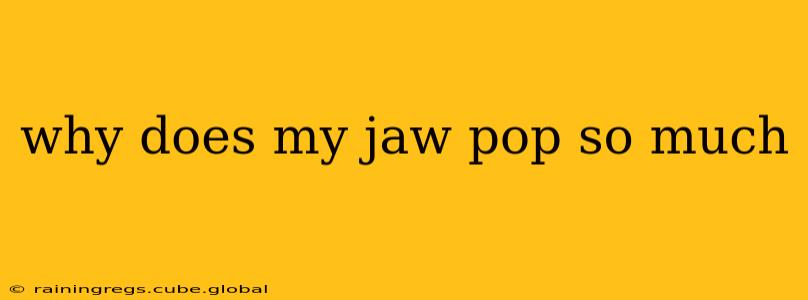Experiencing frequent jaw popping can be unsettling and even painful. This common issue often stems from problems with your temporomandibular joint (TMJ), the hinge connecting your jawbone to your skull. While occasional popping might be harmless, persistent or painful popping warrants a visit to a dentist or doctor specializing in TMJ disorders. This article will explore the various reasons why your jaw might pop so much, offering insights into potential causes and solutions.
What Causes My Jaw to Pop?
The most frequent cause of jaw popping is a temporomandibular joint disorder (TMD). TMD encompasses a range of conditions affecting the TMJ and surrounding muscles. Within TMD, several factors can lead to that characteristic popping sound:
-
Disc Displacement: The TMJ contains a cartilage disc that acts as a cushion between the jawbone and skull. When this disc is displaced, it can slip out of place, causing a popping or clicking sound as the jaw moves. This can range from minor displacement to severe misalignment.
-
Ligament Laxity: The ligaments supporting the TMJ can become stretched or loose, allowing for excessive movement and resulting in popping.
-
Joint Inflammation: Arthritis or inflammation within the TMJ can cause pain and popping. This inflammation can be caused by various factors, including injury, autoimmune diseases, or infection.
-
Muscle Spasms: Tight or spasming muscles surrounding the TMJ can also contribute to popping. Stress, bruxism (teeth grinding), and poor posture can all exacerbate muscle tension.
Why Does My Jaw Pop When I Open My Mouth?
This is often linked to disc displacement. As you open your mouth, the disc might temporarily slip out of its normal position, creating the popping sound. The popping might be accompanied by pain or a feeling of the jaw "catching" or "locking."
Why Does My Jaw Pop and Click?
Popping and clicking often indicate different stages or aspects of TMJ dysfunction. Popping might be a subtle shift of the disc, whereas clicking could signify a more significant displacement or catching of the joint. Both deserve attention, especially if accompanied by pain or limited jaw movement.
Is Jaw Popping Serious?
While not always serious, persistent jaw popping should not be ignored. If the popping is accompanied by pain, limited jaw movement, headaches, earaches, or clicking, it's crucial to seek professional help. Ignoring these symptoms could lead to more severe complications, such as chronic pain or permanent jaw dysfunction.
How Can I Stop My Jaw From Popping?
Treatment for jaw popping depends on the underlying cause and its severity. Options include:
-
Conservative Treatments: These might involve pain relievers, ice packs, gentle jaw exercises, stress management techniques, and changes in diet (avoiding hard or chewy foods). A physical therapist specializing in TMJ disorders can guide you through appropriate exercises.
-
Splints or Mouthguards: These devices can help reposition the jaw and reduce strain on the TMJ.
-
Injections: Corticosteroid injections can reduce inflammation in the joint.
-
Surgery: In rare cases of severe, intractable TMD, surgery might be considered.
What are the Long-Term Effects of Untreated Jaw Popping?
Leaving untreated jaw popping could result in chronic pain, limited jaw movement, persistent headaches, and even changes in your bite. Early intervention often leads to better outcomes and prevents the progression to more severe TMD.
This information is intended for educational purposes only and should not be considered medical advice. If you're experiencing frequent jaw popping or associated symptoms, consult a dentist or healthcare professional for a proper diagnosis and personalized treatment plan. They can perform a thorough examination, determine the root cause, and recommend the most effective course of action. Remember, early intervention is key to managing TMJ disorders successfully.
